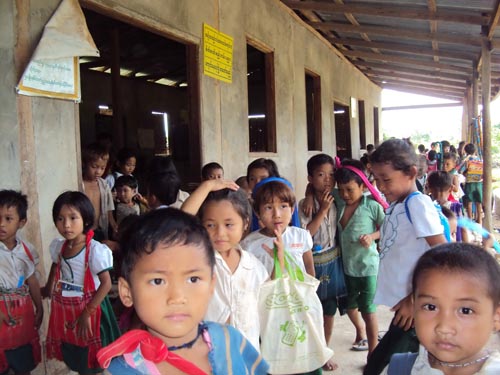Amid much fanfare the new Burma education minister announced in April this year that all compulsory primary education would be free in the academic year 2011 to 2012.

Parents in Karen State say it is now July and so far the much-lauded free education has yet to materalize as promised. A mother of students attending Pa-an Town high school told Karen News that aside from free distribution of text books from the school, other needs such as note books, student guide books and insignia of the school all have to be bought.
“My son is in grade 3 this year. The textbooks are free from the school, but I have to buy a student guidebook for my son on Maths and English. A dozen notebooks are 2,400 Kyat. I also have to buy the school and the class insignia - four or five pairs for each student - that cost me another 5,000 Kyat. The education is far from free, we still have to pay for it.”
Parents say it is not only primary education that has problems, inconsistent secondary education school fees that differ from the education promised policies have also received many complaints.
A Myawaddy resident explained her situation to Karen News.
“There was a case on May 26 during the enrollment of a grade 6 student at Myawaddy high school who had to pay 30,000kyat. The parents filed a complaint about it and after that, the payment was reduced to 8,000 Kyat. For parents whose children are at the so-called free primary level, still have to pay 7,000kyat to enroll. All parents were also expected to put in a donation box at least 5,000kyat.”
A school teacher teaching in Hlaingbwe Township told Karen News that since the beginning of the enrollment period, every primary school student was expected to pay 4,000 Kyat in school fees, and this caused many students whose parents could not afford the money to drop-out.
“In our school, there are over 80 primary level students. After they finish primary level in grade 4, they usually don’t continue on to secondary level. Some students can’t afford to even finish their primary level. Their parents can’t afford to send their kids anymore.”
In rural villages near Hlaingbwe Township, many children from between the age of 5 to 14 could only enroll in primary level to grade 4 and because of the associated costs they usually cannot proceed to secondary or higher level.
Naw Moo Say, a grandmother living in Hlaingbwe Township with her grandson says.
“All my eight children work in Thailand. I am alone except for my 13-year-old grandson. This year he will attend grade 6. I want him to continue his study, but I worry about who will look after me when my grandson is at school?”
Naw Eh is one of the children who had to drop out of school at primary level, she explained to Karen News that her parents needed her to help at home.
“I want to study. But when my mom and dad work on the farm there is no one taking care of my little brother and sister. Mom asked me to quit school and come home to look after them.”
Saw K’paw Wah, a Karen community leader and a school committee member said.
“Even though the government says it has a free education system, as long as parents are having difficulties feeding their families, it won’t benefit the children. It is undeniable truth that if you don’t have food to eat, it is impossible to think about study.”


